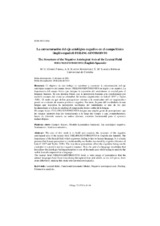La estructuración del eje axiológico negativo en el campo léxico (inglés-español) FEELING-SENTIMIENTO
The Structure of the Negative Axiological Axis of the Lexical Field FEELING/SENTIMIENTO (English-Spanish)
Autor
Gómez Parra, María Elena
Raigón Rodríguez, Antonio R.
Larrea Espinar, A.Mª
Editor
UCOPressFecha
2011Materia
Campos léxicosModelo Lexemático-funcional
Eje axiológico negativo
Sentimiento
Análisis contrastivo
Lexical fields
Functional-Lexematic Model
Negative axiological axis
Feeling
Contrastive analysis
METS:
Mostrar el registro METSPREMIS:
Mostrar el registro PREMISMetadatos
Mostrar el registro completo del ítemResumen
El objetivo de este trabajo es constituir y examinar la estructuración del eje axiológico negativo del campo léxico FEELING/SENTIMIENTO en inglés y en español. La importancia del campo léxico que designa la expresión del sentimiento es crucial para el lenguaje humano. Es una premisa básica que la percepción humana está condicionada por nuestros cuerpos (tal como ya afirmaban las teorías cognitivistas de Lakoff 1987 y Taylor 1989). El modo en que dichas percepciones afectan a la emotividad del ser cognoscitivo puede ser evaluado de manera positiva o negativa. Por tanto, la parte del vocabulario de una lengua que lexicaliza la percepción axiológica del sentimiento es uno de los ejes fundamentales a la hora de analizar el componente léxico verbal de la lengua.
El campo léxico FEELING-SENTIMIENTO designa una amplia gama de percepciones que las lenguas naturales han ido lexicalizando a lo largo del tiempo y que, comprobaremos, hacen de diferente manera en ambos idiomas, cuestión fundamental para el ejercicio traductológico. The aim of this work is to build and examine the structure of the negative axiological axis of the lexical field FEELING/SENTIMIENTO in English and Spanish. The importance of the lexical field which expresses feeling is key to human language. It is a basic premise that human perception is conditioned by our bodies (as stated by cognitive theories of Lakoff 1987 and Taylor 1989). The way those perceptions affect the cognitive being can be evaluated in a positive and in a negative manner. Thus, the part of a language vocabulary that lexicalizes the axiologic feeling perception is one of the main axes while trying to analyze the verbal lexical component in a language.
The lexical field FEELING/SENTIMIENTO holds a wide range of perceptions that the natural languages have been lexicalizing throughout time and which, as we will prove, have done differently, making this study relevant traductologically.

